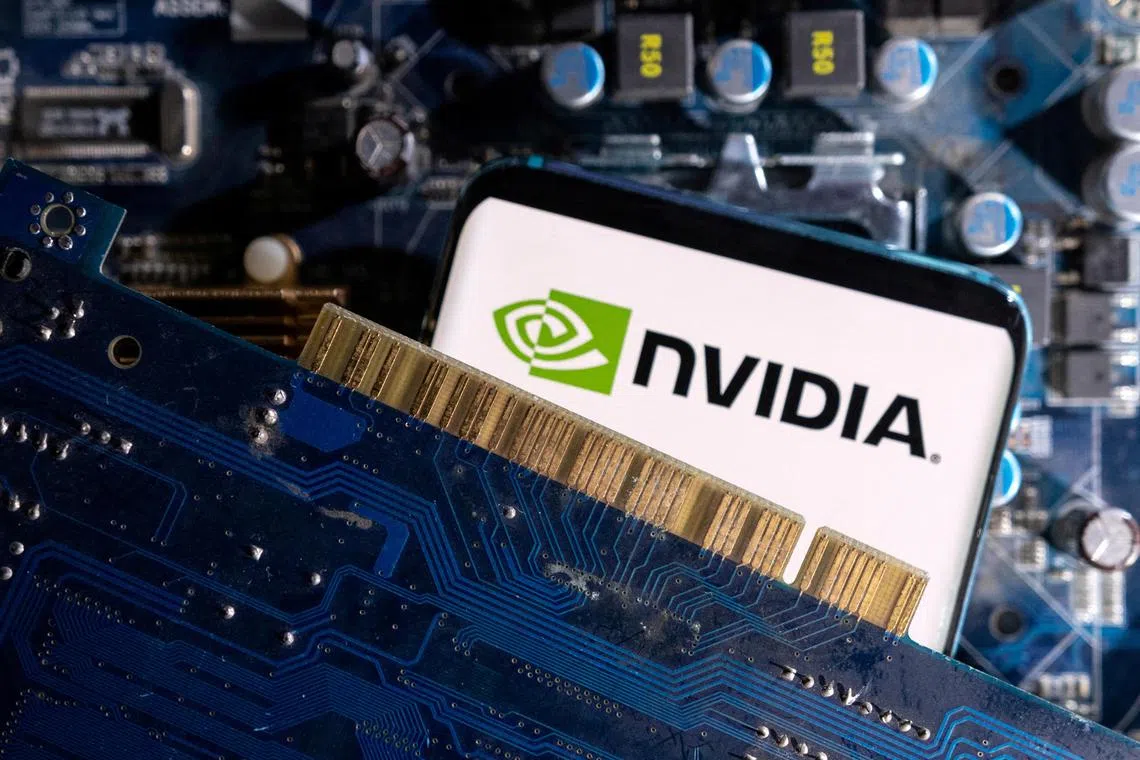Nvidia revenue more than triples as CEO says AI has hit ‘tipping point’
Sign up now: Get ST's newsletters delivered to your inbox

Nvidia co-founder and CEO Jensen Huang said AI demand is surging worldwide across companies, industries and nations.
PHOTO: REUTERS
SAN FRANCISCO - Nvidia, the kingpin of chips powering artificial intelligence, released quarterly financial results that reinforced how the company has become one of the biggest winners of the AI boom, and it said demand for its products would fuel continued sales growth.
The Silicon Valley chipmaker has been on an extraordinary rise over the past 18 months, driven by demand for its specialised and costly semiconductors, which are used for training popular AI services like OpenAI’s ChatGPT chatbot. Nvidia has become known as one of the “Magnificent Seven” tech stocks, which along with others like Amazon, Apple and Microsoft have helped power the stock market.
Nvidia’s valuation has surged more than 40 per cent to US$1.7 trillion (S$2.3 trillion) since the start of 2024, turning it into one of the world’s most valuable public companies.
Last week, the company briefly eclipsed the market values of Amazon and Alphabet before receding to the fifth-most-valuable tech company. Its stock market gains are largely a result of repeatedly exceeding analysts’ expectations for growth, a feat that is becoming more difficult as they keep raising their predictions.
On Feb 21, Nvidia reported that revenue in its fiscal fourth quarter more than tripled from a year earlier to US$22.1 billion, while profit soared nearly ninefold to US$12.3 billion. Revenue was well above the US$20 billion the company predicted in November and above Wall Street estimates of US$20.4 billion.
Nvidia predicted that revenue in the current quarter would total about US$24 billion, also more than triple the year-earlier period and higher than analysts’ average forecast of US$22 billion.
Nvidia’s co-founder and chief executive Jensen Huang argues that an epochal shift to upgrade data centres with chips needed for training powerful AI models is still in its early phases. That will require spending roughly US$2 trillion to equip all the buildings and computers to use chips like Nvidia’s, he predicts.
“Accelerated computing and generative AI have hit the tipping point,” Mr Huang said in a news release. “Demand is surging worldwide across companies, industries and nations.”
In a later interview, Mr Huang said much more growth for the company lay ahead. “We are one year into generative AI,” he said. “My guess is we are literally into the first year of a 10-year cycle of spreading this technology into every single industry.”
Some analysts had predicted a sell-off after the Nvidia announcement, a reaction to just how high its share price has risen. But shares increased more than 9 per cent in after-hours trading.
“Despite concerns over its high valuation, Nvidia’s unparalleled AI-related intellectual property, rooted in decades of visionary investment, sets it apart in a league of its own,” wrote Mr Hans Mosesmann, an analyst at Rosenblatt Securities, in a research report before the company reported.
One factor driving Nvidia’s latest revenue growth is the ability of the company’s production partners, led by Taiwan Semiconductor Manufacturing Company, to boost supplies of Nvidia’s flagship AI chip, which commands prices ranging from US$15,000 to US$40,000.
Mr Huang told analysts on Feb 21 that the availability of those chips had improved significantly but noted that the company would soon introduce new products that would again be scarce.
But giant cloud computing companies like Amazon, Google and Microsoft are designing their own AI chips to use in addition to Nvidia’s, and rival chipmakers keep introducing their own AI products.
Intel, which has long dominated the standard microprocessor chip industry but lags in AI, marshalled an array of partners and potential customers on Feb 21 to discuss its plans to offer manufacturing services, which could boost industry capacity to build AI chips. Attendees included Mr Sam Altman, who relies heavily on Nvidia chips as OpenAI’s CEO.
The Biden administration has raised another set of hurdles for Nvidia and other US chip manufacturers, placing restrictions on their chip sales in China. Nvidia has responded by selling less-powerful versions of some products there.
Still, the company said on Feb 21 that its sales to China had dropped to a mid-single-digit percentage of its data centre chip revenues, from 19 per cent in its 2023 fiscal year.
Meanwhile, some experts worry that a global rollout of the company’s pricey, power-hungry chips will overtax countries’ power grids and budgets. NYTIMES


